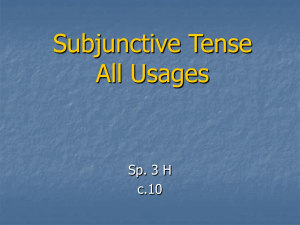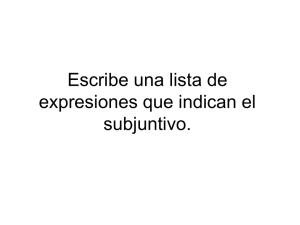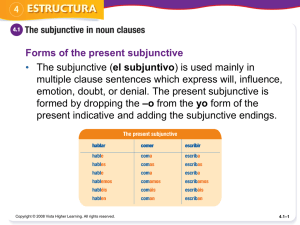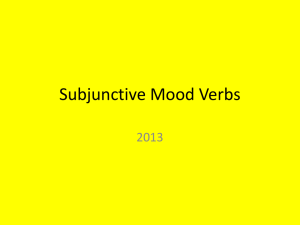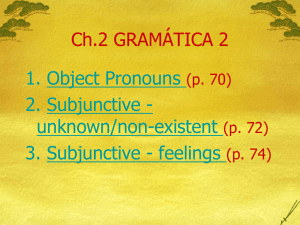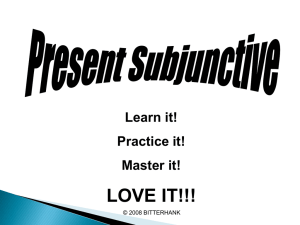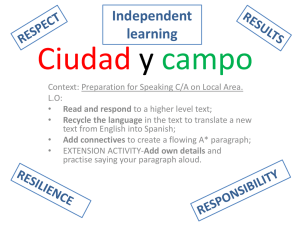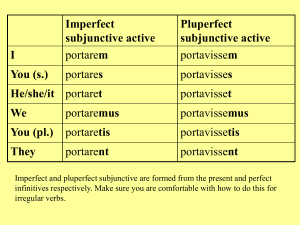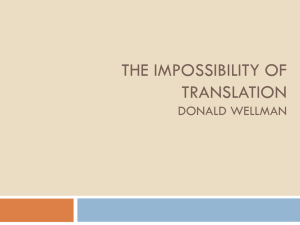Subjunctive vs. Indicative by Cara and Kate
advertisement
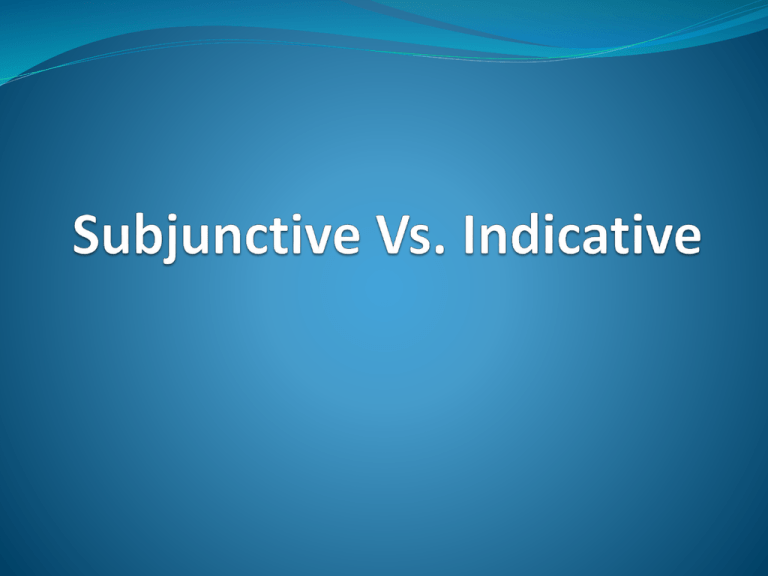
Subjunctive: Part 1 All to frequently, the topic of the subjunctive is made far more difficult than is necessary. Let’s try a slightly different approach, with the goal of making this topic less troublesome. The subjunctive is not a tense; rather, it is a mood. Tense refers when an action takes place. Can you name the three tenses? Past Present Future Now can you name these three tenses in Spanish? Pasado Presente Futuro Tense vs. Mood In English grammar, we talk about tense all the time. It is rare to hear a grammarian talk about mood, however. What does the word mood mean to you? Ok, in common speech, mood is exactly that. Our mood refers to how we are feeling. Typical words that reflect mood might be happy, sad, scared, angry, depressed, excited, and you get the point. Tense vs. Mood When we are talking about the mood of a sentence, the meaning is a bit different. Mood reflects how the speaker or subject feels about the action. The subjunctive mood is rarely used in English, but it is widely used in Spanish. Indicative vs. Subjunctive So far, you have studied verb tenses in the indicative mood. What word do you see in the term indicative? İMuy bien! And what exactly does the term indicate mean? Yes, to indicate is to specify or show something. For example, we might indicate the correct answer on a multiple-choice test by circling a letter. Indicative vs. Subjunctive The indicative mood indicates factual information, certainty, and objectivity. Can you think of an example? Usted va a Perú en diciembre. You are going to Peru in December. The above sentence merely reports or indicates the fact that you are going to Peru in December, so the indicative mood is used. Indicative vs. Subjunctive How about this sentence: El cielo es azul. Do you think that’s indicative? Why? Correcto. The sky is blue is a fact. Indicative vs. Subjunctive Let’s change the above example slightly: Yo no dudo que usted va al Perú en diciembre. I don’t doubt that you are going to Peru in December. What did we change about the sentence? İExactamente! We added a clause that indicates certainty. In the above sentence, the clause “no dudo” introduces a quality of certainty , -the speaker has no doubt, so the indicative mood is used in the second clause (va) as well as the first (no dudo). Note: This sentence now has two subjects. Every subjunctive sentence has two subjects. Can you name the two subjects in the sentence? 1. Yo = I 2. Usted = you Indicative vs. Subjunctive Let’s make another slight change to our example: Dudo que usted vaya al Perú en diciembre. I doubt that you are going to Peru in December. So, what did we change now? Yes, we said I doubt instead of I don’t doubt. Do you think this sentence is indicative? Why or why not? That’s right! We already said that the indicative mood indicates factual, certain information. The minute we add doubt, the sentence can no longer be indicative. In the above sentence, the clause “dudo” introduces a quality of uncertainty, -- the speaker does have doubt, so here the subjunctive mood is used in the second clause (vaya). Btw, how many subjects does this sentence have? Subjunctive: Part 1 The subjunctive mood is used to express everything except certainty and objectivity: things like doubt, uncertainty, subjectivity, etc. Yo dudo que usted vaya al Perú en diciembre. I doubt that you are going to Peru in December. Since the above statement does not express certainty, the subjunctive (vaya) is required in the second clause. The difference between indicative and subjunctive is the difference between certainty/objectivity (indicative) and possibility/subjectivity (subjunctive). Indicative John goes to the store. Is this sentence indicative or subjunctive and why? (This sentence merely states the certain, objective fact that John goes to the store. It is indeed indicative.) I know that John goes to the store. (The clause “I know” tells us that the speaker feels that it is a certain, objective fact that John goes to the store.) There is no doubt that John goes to the store. (The clause “there is no doubt” tells us that the speaker feels that it is a certain, objective fact that John goes to the store.) Subjunctive I want John to go to the store. (The clause “I want” tells us that the speaker feels that there is uncertainty as to whether John goes to the store.) I hope that John goes to the store. (The clause “I hope” tells us that the speaker feels that there is uncertainty as to whether John goes to the store.) It is possible that John will go to the store. (The clause “it is possible” tells us that the speaker feels that there is an uncertainty as to whether John goes to the store.) It’s good that John goes to the store. (The clause “it’s good” alerts us that the speaker is about to express a subjective opinion.) It’s important that John goes to the store. (The clause “it’s important” alerts us that the speaker is about to express a subjective opinion.) Subjunctive Because there must be some uncertainty or subjectivity to warrant the use of the subjunctive, you will usually see it in sentences that contain a main clause which introduces a quality of uncertainty or subjectivity. 1. I hope that she will come. What is the main or independent clause here? I hope = independent clause If I hope is the independent clause, what do we call that she will come? Right, the clause is dependent because it cannot stand on its own. 2. I know that she will come. I know = independent clause 3. I feel that she will come. I feel = independent clause. The above examples all have main clauses, but only the first and the third introduce an element uncertainty or subjectivity. Subjunctive Recap In learning to use the subjunctive, it is quite helpful if we can first recognize such clauses. So far, you have studied verb tenses in the indicative mood. The indicative mood is used to express factual information, certainty, and objectivity. It merely reports the fact of what’s happening. Usted va a Perú en diciembre. You are going to Peru in December. The subjunctive mood is used to express everything except certainty and objectivity: things like doubt, uncertainty, subjectivity, etc. Yo dudo que usted vaya al Perú en diciembre. I doubt that you are going to Peru in December. Subjunctive-Subjuntivo Indicative Certainty, objectivity, facts, reality. Subjunctive Uncertainty, subjectivity, feelings, emotions. Indicative Juan va a la tienda. John goes to the store. This sentence merely states the certain, objective fact that John goes to the store. Yo sé que Juan va a la tienda. I know that John goes to the store. The clause “I know” tells us that the speaker feels that it is a certain, objective fact that that John goes to the store. No hay duda de que Juan va a la tienda. There is no doubt that John goes to the store. The clause “there is no doubt” tells us that the speaker feels that it is a certain, objective fact that John goes to the store. Subjunctive Yo quiero que Juan vaya a la tienda. I want John to go to the store. The clause “I want” tells us that the speaker feels that there is uncertainty as to whether John goes to the store. Yo espero que Juan vaya a la tienda. I hope that John goes to the store. The clause “I hope” tells us that the speaker feels that there is uncertainty as to whether John goes to the store. Es posible que Juan vaya a la tienda. It is possible that John will go to the store. The clause “it is possible” tells us that the speaker feels that there is uncertainty as to whether John goes to the store. Es bueno que Juan vaya a la tienda. It’s good that John goes to the store. The clause “its good” alerts us that the speaker is about to express a subjective opinion. Es importante que Juan vaya a la tienda. It’s important that John goes to the store. The clause “it’s important” alerts us that the speaker is about to express a subjective opinion Tense vs. Mood Can you remember the three tenses? Past, Present, Future. There are also three moods. At this point, you can name two. What are they? Subjunctive, Indicative. The third one is called the imperative mood. An imperative sentence gives a command. More on that later… Tense vs. Mood Tiempo (Tiempo de la acción.) Modo (La actitud del sujeto.) 1. Pasado 1. Imperativo 2. Presente 2. Indicativo 3. Futuro 3. Subjuntivo Indicative Subjunctive Tomás no trabaja. Creo que es perezoso. Sé que limpia su carro. Es importante que trabaje. Dudo que sea trabajador. Quiero que limpie su cuarto también. Objective Facts Certainty Same ending Ar A Er/Ir E Subjective Doubts Feelings Opposite ending Ar Er/Ir E A Subjunctive There is a helpful acronym to help us remember when to use the subjunctive. I’m warning you, it’s a bit strange. Before we see the acronym, what did we already learn that every subjunctive sentence must have? Great memory! It must have a change in subject. Are you ready for that strange acronym now? Drum roll, please… WEIRDO W (Wishes, wants) Quiero que ellos estén contentos. (S) Sé que ellos están contentos. (I) E (Emotions) I (Impersonal Es importante que hagas la tarea. (S) Expressions) Haces la tarea todas las noches. (I) R (Requests, Recomiendo que John tenga su propio dormitorio. Recommendations) (S) Estoy segura que lo tiene. (I) D (Doubts) O (Ojalá= I hope) Ojalá (que) ganemos. (S) Ganamos el partido. Tengo miedo de que haya cucarachas en la cocina. (S) Sé que hay cucarachas en la cocina. (I) Dudo que venga José. (S) Creo que José sí viene. (I) Indicative Hablar Comer Hablo Como Hablas Comes Habla Come Hablamos Comemos Hablan Comen Subjunctive Hablar Comer Hable Coma Hables Comas Hable Coma Hablemos Comamos Hablen Coman Conjugation Practice Indicative Subjunctive 1. Yo sé que él _____________. 1. Yo dudo que él __________. Venir Estudiar Saber Ver Comer Escuchar Bailar Ir Pagar Correr Tener Hablar Decir Mirar Venir Estudiar Saber Ver Comer Escuchar Bailar Ir Pagar Correr Tener Hablar Decir Mirar İBonito Trabajo! ¡INTÉNTALO! ¿Subjuntivo o Indicativo? Completa estas frases con la forma correcta del verbo. trabajen 1. Dudo que ellos ________(trabajar). 2. Es cierto que él ______ coma (comer) mucho. salgan (salir). 3. Es imposible que ellos ______ ganen (ganar). 4. Es probable que ustedes ______ 5. No creo que ella _______ vuelva (volver). vayamos (ir). 6. Es posible que nosotros _______ recicles (reciclar). 7. Dudamos que tú ________ juegan (jugar) al fútbol. 8. Creo que ellos _______ ¡INTÉNTALO! Completa estas frases con la forma correcta del verbo. estudian (estudiar). 9. No niego que ustedes _______ venga (venir) a casa. 10. Es posible que ella no _______ duerman (dormir). 11. Es probable que ellos ________ 12. Es posible que Marta _______ (llamar). llame oiga (oír). 13. Tal vez Juan no nos _____ ayuden (ayudar). 14. No es cierto que ellos nos ________ se aburre (aburrirse). 15. Es obvio que Luis _________ va (ir) a casarse. 16. Creo que Juana _____
